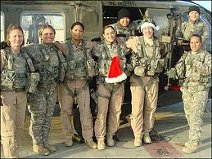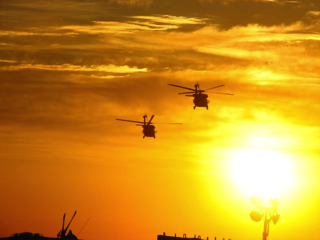Home Front by Kristin Hannah (St. Martin's Press, $27.99 hardcover, 9780312577209, January 31, 2012)
 What happens when you live a life based on a glass half full, and the glass shatters? In Kristin Hannah's 20th book, Home Front, we find out, as the world of a strong, willfully positive woman is upended by a faltering marriage and the Iraq War.
What happens when you live a life based on a glass half full, and the glass shatters? In Kristin Hannah's 20th book, Home Front, we find out, as the world of a strong, willfully positive woman is upended by a faltering marriage and the Iraq War.
Jolene Larsen grew up with alcoholic parents who were killed in a crash when she was 17. Jo believed that some families were like well-tended parks, others like battlefields, "littered with shrapnel and body parts." Determined to create a well-tended life, she joined the army at age 18, where she met her best friend, Tami Flynn. They spent 10 years in the service, then, with marriage and motherhood, moved to the National Guard. Now, at 41, Jolene Zarkades has that tidy park: her husband, Michael, a lawyer; two daughters, 12-year-old Betsy and four-year-old Lulu; Tami next door on Bainbridge Island in Puget Sound; and work--she and Tami are Black Hawk helicopter pilots in the Guard. Jolene is the chief, and her crew trusts her.
 But Jolene's carefully managed life has some fissures. Her husband has become distant, though she's chosen not to get upset. "What would be the point? Happiness was a choice she knew how to make." Less troubling, still difficult, are Betsy's preteen anguishes, like a mom in the military who wears her flight suit to career day ("Fine. Ruin my life."), and classmates who have shunned her.
But Jolene's carefully managed life has some fissures. Her husband has become distant, though she's chosen not to get upset. "What would be the point? Happiness was a choice she knew how to make." Less troubling, still difficult, are Betsy's preteen anguishes, like a mom in the military who wears her flight suit to career day ("Fine. Ruin my life."), and classmates who have shunned her.
Michael's idealism has been dulled by too many years defending guilty clients, and the death of his father--his law partner--weighs heavily. He can't talk to Jolene about it; she has the tightest grip on her emotions of anyone he's ever seen... except for love. Love she gives freely and deeply. But doubt? No. Anger? No. Sadness? No. Michael wants something more than a happy face and an ordered life, and he's always hated her commitment to the military; since the war in Iraq started, he's become even more negative.
When Michael misses Jo's birthday, she reluctantly considers the loneliness in not being able to talk to her husband about what matters to her. A few days later, when he skips Betsy's track meet and Jolene calls him to task instead of making the usual excuses, he tells her, "I don't love you anymore." She is devastated. She had found herself in the army, she had found her passion in flying, but with Michael, she believed, she had found completion. And now? Five words rock her foundation. Then, the next day, she and Tami learn they are being deployed.
"Honor. Duty. Loyalty. These were more than words to Jolene; they were part of her. She'd always been two women--a mother and a soldier--and this deployment ripped her in half, left a bloody, gaping tear between the two sides of her." She doesn't want to leave, and yet she wants to go. She and Tami had trained for this for 20 years. And she has no choice.
Her children are devastated, Michael is angry and resentful--how can he handle his law firm and his family? Even with the help of his Greek mother, Mila, he feels overwhelmed, and guilty for being selfish. Jolene's innate optimism fails her. She needs Michael now, and he lets her down. She videotapes a story for Lulu, she tapes advice and love for Betsy, she writes "the letter" to her daughters and husband ("I loved you. Beginning to end."), and Chief Warrant Officer 3 Zarkades goes to war.
Their new lives start. Michael is representing Keith Keller, an ex-marine with two Iraq tours, arrested for killing his wife. He's also figuring out how to get the girls fed and off to school. With Keller, Michael learns about PTSD; with his daughters, he learns how to be a parent. And he misses Jolene: "How was it he hadn't foreseen what his life would be like without her?"
 Jolene and Tami settle into dust, wind and constant mortar attacks. They ferry VIPs, they deliver supplies and they go on missions to retrieve soldiers' remains. Increasingly, they go on air assault missions, rescuing troops trapped under fire. On one such mission, they are hit by rocket fire and crash.
Jolene and Tami settle into dust, wind and constant mortar attacks. They ferry VIPs, they deliver supplies and they go on missions to retrieve soldiers' remains. Increasingly, they go on air assault missions, rescuing troops trapped under fire. On one such mission, they are hit by rocket fire and crash.
Jolene wakes up in a white room, with machines clustered around her, monitor heads like "thin washed-out mourners." Tami, whom she pulled out of their burning Black Hawk, has suffered a traumatic brain injury. Jo's leg festers with gangrene from the blast damage, she has nightmares, and is filled with (unwarranted) guilt. She spurns Michael, who has flown to the base hospital, unable to focus on anything but her grief and rage when she loses her leg. She knows Michael will stay with her now for the wrong reasons. "Pity would bring him back to her; duty would make him stay."
Jolene is consumed with anger, bitterness, exhaustion, loneliness. Her days of smiling through pain and loss are over. She comes home to a rehab center, and her reunion with her children goes badly. She wants to feel joy, but feels nothing. She disappoints and even scares them. She masks her fear and anger with drugs, alcohol and stoicism. "From her cockpit, she had seen forever... and now she needed help to go to the bathroom."
How does a soldier come home from war, Michael asks at Keller's trial. What price deployment? War changes the warriors, but the code of warriors can prevent them from seeking help. War changes the home front as well, and the healing power of family is mixed with expectations on both sides, and lack of information. "We can come home broken, [Jo] thought. No matter how strong we are.... The military should have prepared her for it. There was so much training before one goes to war, and so little for one's return."
Jo loses her balance--physically and emotionally. She's in crisis. A PSTD therapist tells Michael, "There's no front line over there. The war is all around them, every day, everywhere they go. Some handle it better than others. We don't know why, but we do know this: the human mind can't safely or healthily process that kind of carnage and uncertainty and horror. It just can't. No one comes back from war the same."
Kristin Hannah has written a passionate, inspired story of war's cost to a family; even more, the cost of silence. She seamlessly weaves the two sides of a soldier's heart--the damage and the horror inflicted upon it with the honor and pride that make it beat--in Jolene. She is a hero, and her life is a hero's journey, psychological and spiritual and physical. It's made with others--family, the Guard, Tami--and it's a journey that we are privileged to share. --Marilyn Dahl
To listen to an clip from the Home Front audio, click here.
photos courtesy of Teresa Burgess







 What happens when you live a life based on a glass half full, and the glass shatters? In Kristin Hannah's 20th book, Home Front, we find out, as the world of a strong, willfully positive woman is upended by a faltering marriage and the Iraq War.
What happens when you live a life based on a glass half full, and the glass shatters? In Kristin Hannah's 20th book, Home Front, we find out, as the world of a strong, willfully positive woman is upended by a faltering marriage and the Iraq War. But Jolene's carefully managed life has some fissures. Her husband has become distant, though she's chosen not to get upset. "What would be the point? Happiness was a choice she knew how to make." Less troubling, still difficult, are Betsy's preteen anguishes, like a mom in the military who wears her flight suit to career day ("Fine. Ruin my life."), and classmates who have shunned her.
But Jolene's carefully managed life has some fissures. Her husband has become distant, though she's chosen not to get upset. "What would be the point? Happiness was a choice she knew how to make." Less troubling, still difficult, are Betsy's preteen anguishes, like a mom in the military who wears her flight suit to career day ("Fine. Ruin my life."), and classmates who have shunned her. Jolene and Tami settle into dust, wind and constant mortar attacks. They ferry VIPs, they deliver supplies and they go on missions to retrieve soldiers' remains. Increasingly, they go on air assault missions, rescuing troops trapped under fire. On one such mission, they are hit by rocket fire and crash.
Jolene and Tami settle into dust, wind and constant mortar attacks. They ferry VIPs, they deliver supplies and they go on missions to retrieve soldiers' remains. Increasingly, they go on air assault missions, rescuing troops trapped under fire. On one such mission, they are hit by rocket fire and crash.
 Bestselling author Kristin Hannah graduated from law school in Washington State and practiced law in Seattle before becoming a full-time writer. She lives with her husband and their son in the Pacific Northwest. Her many novels have explored relationships between and among women--sisters, mothers, daughters and friends--in a way that resonates with her readers. Her latest book, Home Front, is an ambitious departure; once again, Hannah covers a sensitive topic--the impact of war on a family with a member in the military, and a marriage in trouble-- but this time, the military member is a wife and mother, complicating ordinary notions of honor, duty and love.
Bestselling author Kristin Hannah graduated from law school in Washington State and practiced law in Seattle before becoming a full-time writer. She lives with her husband and their son in the Pacific Northwest. Her many novels have explored relationships between and among women--sisters, mothers, daughters and friends--in a way that resonates with her readers. Her latest book, Home Front, is an ambitious departure; once again, Hannah covers a sensitive topic--the impact of war on a family with a member in the military, and a marriage in trouble-- but this time, the military member is a wife and mother, complicating ordinary notions of honor, duty and love. On your nightstand now:
On your nightstand now: